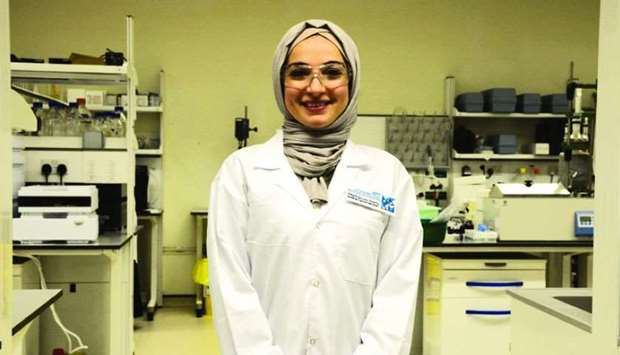A research associate at Qatar Environment and Energy Research Institute (QEERI) made significant advancements in developing a sustainable mechanism for wastewater treatment and reuse, as part of her work at the research institute’s Water Centre.
QEERI is part of Hamad Bin Khalifa University (HBKU), which is a member of Qatar Foundation (QF).
Dr Deema al-Masri was a recipient of the prestigious Women in Science (WIS) fellowship, offered by Qatar National Research Fund (QNRF), also a member of QF – in collaboration with CRDF Global.
“The WIS fellowship opened many doors for me, and was a game changer in my professional life. I am grateful for the wonderful opportunities that QNRF has provided me, and the strong role it perpetually plays in inspiring female researchers to pursue careers within STEM (science, technology, engineering and mathematics) fields,” Dr al-Masri said.
The fellowship aimed to foster a research culture in Qatar with a focus on building a new generation of talented local female researchers.
While pursuing her Doctor of Philosophy at HBKU, Dr al-Masri was selected as one of the two recipients of the WIS fellowship.
As part of the award, QNRF funded her PhD research and stay at the University of Texas at Austin during 2017, where she further explored her research on developing solutions for water purification and wastewater treatments suitable for Qatar.
During this time, she was able to gain experience in the fabrication of ceramic discs for water filtration, resulting in developing a low-cost, eco-friendly, and effective adsorbent for water purification.
Building on this innovation, the research by Dr al-Masri and her colleagues at QEERI now focuses on developing membranes to treat wastewater, which will not only act as adsorption agents, but will also have a sieving effect to purify water from any contaminants.
According to QNRF, water scarcity and water pollution is a serious challenge for Qatar and has been identified as a priority for environmental development in the Qatar National Vision 2030.
Dr al-Masri’s research project carries a lot of significance as it focuses on developing a sustainable and innovative mechanism for preservation of water and its recycling for industrial, sanitation, and agricultural purposes, along with increasing Qatar’s freshwater storage capacity.
QNRF executive director Dr Abdul Sattar al-Taie said: “We are very pleased to observe an increasing interest to study STEM subjects among local female students. This is highly inspiring for the development of Qatar’s local research capacity, and therefore we encourage our female students to pursue scientific research in their field of study.”
“The achievements of Dr al-Masri and the importance of her research for water scarcity in Qatar is a vivid testament to how successful the program was, and makes her the perfect role model for our budding future female scientists, researchers, and engineers,” he noted.
QNRF offers several funding and capacity development programmes to increase the number of researchers and professionals applying their knowledge and skills to contribute to the development of Qatar, while increasing Qatar’s research and development profile.

